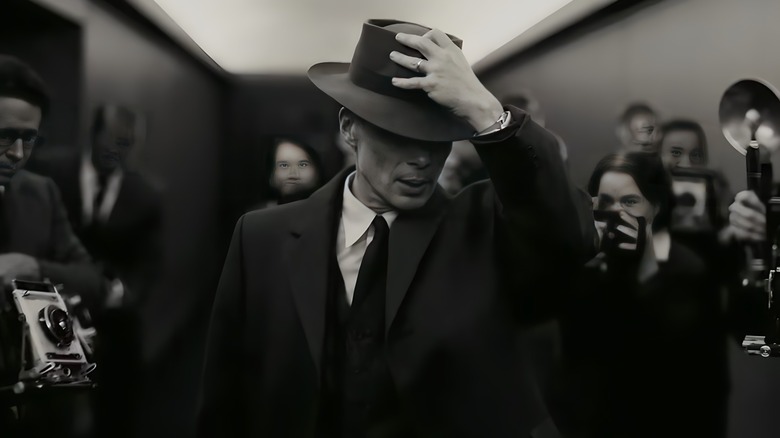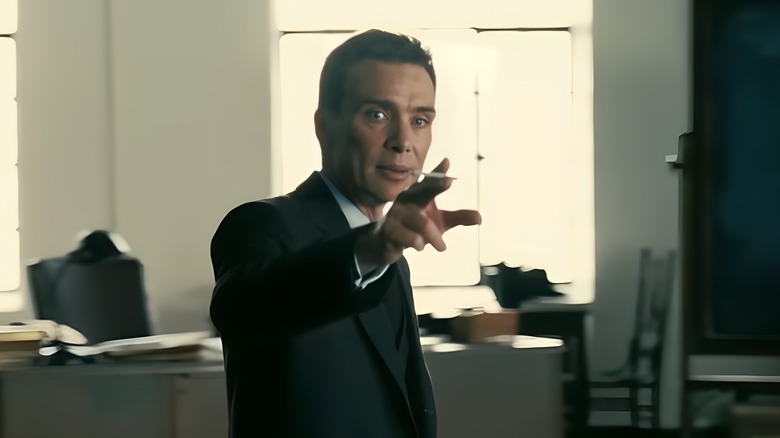Oppenheimer: What Playing The Physicist Was Really Like For Cillian Murphy
Without question, Cillian Murphy's sixth collaboration with Christopher Nolan in the historical drama "Oppenheimer" features the actor's most intense work for the revered filmmaker to date. In fact, Murphy went to such great lengths that his off-screen actions began to mimic his on-screen counterpart, J. Robert Oppenheimer, the theoretical physicist who led a team of scientists in developing the atomic bomb in the 1940s.
The reason why Murphy — the actor who plays Oppenheimer — looks so familiar is because he has been working with Nolan since 2005. Murphy landed the role of the villainous Scarecrow in Nolan's "Batman Begins," which oddly came after he created an "electric atmosphere" when he tried on the Batsuit in his failed bid to play the title role. From there, Murphy appeared in supporting roles in Nolan's "The Dark Knight," The Dark Knight Rises," "Inception," and "Dunkirk."
As the lead in "Oppenheimer," Murphy is in nearly every scene, which required his presence at most if not all of the film's settings. According to The Guardian, the endless travel resulted in Murphy skipping meals and losing lots of sleep. "It's like you're on this f***ing train that's just bombing," Murphy told The Guardian. "It's bang, bang, bang, bang. You sleep for a few hours, get up, bang it again. I was running on crazy energy; I went over a threshold to where I was not worrying about food or anything. I was so in it, a state of hyper ... hyper something. But it was good because the character was like that. He never ate."
Murphy highlighted one of Oppenheimer's worst habits in the film
"Oppenheimer" tells a pair of crucial stories from J. Robert Oppenheimer's life simultaneously. One chronicles the theoretical physicist's university years and his recruitment by U.S. Army Corps of Engineers General Leslie Groves (Matt Damon) to develop the atomic bomb, leading to the landmark Trinity nuclear weapon test and the fateful bombings of Hiroshima and Nagasaki in Japan to end World War II.
In addition, the film chronicles how Oppenheimer was subjected to secret backroom hearings by the U.S. Atomic Energy Commission. Orchestrated by his political enemies, the AEC hearings were the government's attempt to discredit the physicist after he warned against the continuing development of nuclear weapons during the Cold War. As such, Oppenheimer was wrongfully accused of being a communist since he had deep ties to members of the Communist Party — particularly American psychiatrist Jean Tatlock (Florence Pugh), with whom he had an affair.
With such a high-stress existence, it shouldn't come as a big surprise that Oppenheimer is constantly smoking in the movie — a habit that undoubtedly led to the scientist's throat cancer diagnosis and eventual death at age 62 in 1967. "[He would smoke] cigarettes and pipes. He would alternate between the two. That's what did for him in the end," Cillian Murphy told The Guardian. "I've smoked so many fake cigarettes for [the Netflix series] 'Peaky [Blinders]' and this. My next character will not be a smoker. They can't be good for you. Even herbal cigarettes have health warnings now."
Also starring Robert Downey Jr., Emily Blunt, Rami Malek, David Dastmalchian, and Kenneth Branagh, "Oppenheimer" is playing in theaters.

